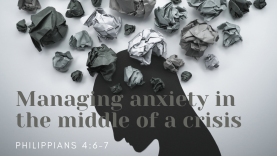What You Can Do to Cope With Anxiety
Mar 1, 2022 | by Dr. Katharina Star, PHD

If you or a loved one are struggling with anxiety, contact the Substance Abuse and Mental Health Services Administration (SAMHSA) National Helpline at 1-800-662-4357 .
1 Stop and Breathe
When anxiety flares, take a time out and think about what it is that is making you so nervous. Anxiety is typically experienced as worrying about a future or past event. For example, you may be worried that something bad is going to happen in the future. Perhaps you continually feel upset over an event that has already occurred. Regardless of what you are worried about, a big part of the problem is that you are not being mindful of the present moment. Anxiety loses its grip when you take your focus off of worry and bring your awareness back to the present.
The next time your anxiety starts to take you out of the present, regain control by sitting down and taking a few deep breaths. Taking a moment to stop and breathe can help restore a sense of personal balance and bring you back to the present moment. However, if you have the time, try taking this activity a little further and experiment with a breathing exercise and mantra. Practice this simple breathing technique: Begin by getting into a comfortable seated position. Close your eyes and inhale slowly through your nose.
Follow this inhalation with a deep exhalation. Continue to breathe deeply and fully, in and out of your nose. Allow your breath to be a guide to the present. Use the mantra, “Be Present” as you breathe. With each breath in, think to yourself “be” and with each breath out, focus on the word “present.” Breathing exercises are powerful relaxation techniques that can help ease your body and mind of anxiety while turning your attention towards the present.
2 Figure Out What's Bothering You
3 Focus on What You Can Change
Replace your fears by changing your attitude about them. For example, stop fearing to lose your job and instead focus on how grateful you are to have a job. Come to work determined to do your best. Instead of fearing your loved one's safety, spend time with them, or express your appreciation of them. With a little practice, you can learn to dump your anxiety and pick up a more positive outlook.
At times, your anxiety may actually be caused by a real circumstance in your life. Perhaps you’re in a situation where it is realistic to be worried about losing your job due to high company layoffs or talks of downsizing. When anxiety is identified as being caused by a current problem, then taking action may be the answer to reducing your anxiety. For example, you may need to start job searching or scheduling interviews after work. Recap - Another way to cope with anxiety is to focus on the things you can change. By being more proactive, you can feel like you have a bit more control over your situation.
4. Distract Yourself
At times, it may be most helpful to simply redirect yourself to focus on something other than your anxiety. You may want to reach out to others, do some work around your home, or engage in an enjoyable activity or hobby. Here are a few ideas of things you can do to thwart off anxiety: Do some chores or organize around the house Engage in a creative activity, such as drawing, painting, or writing Go for a walk or engage in some other form of physical exercise, Listen to music, Pray, meditate, read, or watch a funny movie.
5 Strengthen Your Body and Brain
Sleep can also have a powerful effect on your mental well-being and anxiety levels. Research has found that problems with sleep are one risk factor for developing anxiety disorders, including generalized anxiety disorder. Short-term disruptions in your sleep may lead to increased levels of stress and anxiety. Recap - Taking care of your mind and body may also be helpful for preventing and relieving anxiety. To combat anxiety, focus on eating a healthy diet, engage in regular physical exercise, and get enough rest.


